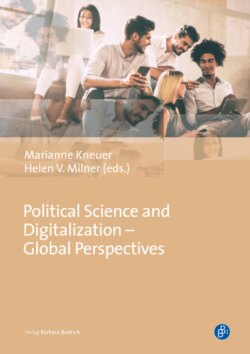Читать книгу Political Science and Digitalization - Global Perspectives - Группа авторов - Страница 39
На сайте Литреса книга снята с продажи.
[53] Digitalization and Political Science in Paraguay Liliana Rocío Duarte-Recalde1 1 Introduction
ОглавлениеThe increasing presence of digital tools as a disruptive force in global political dynamics compels academia to pay attention to both the phenomenon taking place and to the disciplinary developments that account for it. A regional focus of the analysis responds to the need to provide explanations of the phenomenon in its context, which is crucial to improve our understanding of the “diverse and peculiar” political processes (Murillo 2015: 576) that are taking place. While studies about political science in Latin America have shown “good progress on issues such as the extension of undergraduate and postgraduate programs, the quality of academic production and the social recognition of the profession” (Rocha-Carpiuc 2016: 458), other topics such as particular research agendas are scarcer.
Heterogeneity in the institutionalization of the discipline is also persistent throughout the region, as shown by the multiple accounts of asymmetries in the development of political science among Latin American countries (Altman 2005, Huneeus 2006, Barrientos del Monte 2013, Vidal de la Rosa 2013; Geary et al. 2015). In particular, the development of political science in Paraguay has faced multiple difficulties since the opening of the first program in this area in 1993 at the Catholic University “Nuestra Señora de la Asunción”. Though currently the program is taught in this and the National University of Asunción – the most important and well-established universities of the country– their faculty remains made up mostly by professionals without specific training in the discipline, while the syllabi are outdated. This makes up for an institutional context that is not conducive to the development of Paraguayan political science, which has had limited progress so far.
Furthermore, Paraguayan universities do not promote research as a regular basis for the development of knowledge in the social sciences. This has created a situation where the teaching of the discipline involves memorized repetitions of pre-established material, generally lacking any critical thinking. Thus, the successive cohorts of political science students are educated without acquiring the theoretical or methodological tools necessary to do research in this area. In this context, student access to digital tools and online learning platforms provide a window of opportunity for academic development in the area, as these resources allow the continuous training of professionals beyond the institutional framework of the universities, as well as opportunities to participate in international research projects, which provide room for their specialization in practice in a way that was not [54] possible before. Information technology is thus essential for the development of political science in Paraguay.2
This paper is an exploratory work focused on the way in which the digital era poses opportunities and challenges for political science in Paraguay, 3 in the context of weak institutions of higher education. After performing a review of the state of the discipline in the country, we will identify the current use of digital tools both in the process of teaching and in research in the area, emphasizing the opportunities that they present while also highlighting the challenges that they imply. To do so, we review documentary and testimonial information related to both the Catholic University and the National University of Asuncion, the main institutions of higher learning that offer political science programs on a regular basis (Duarte Recalde 2015: 168).
